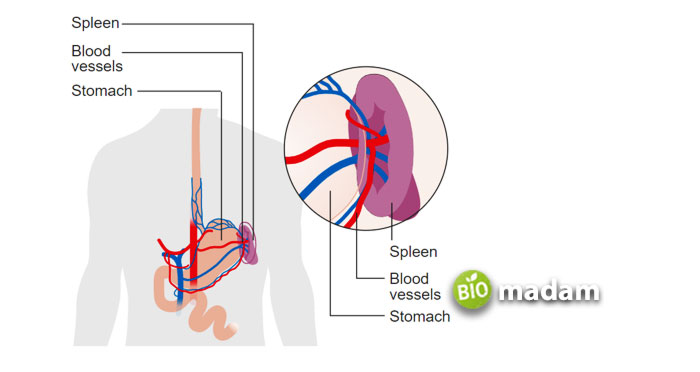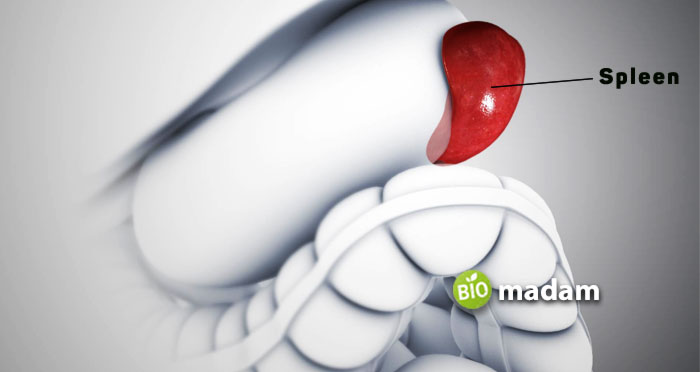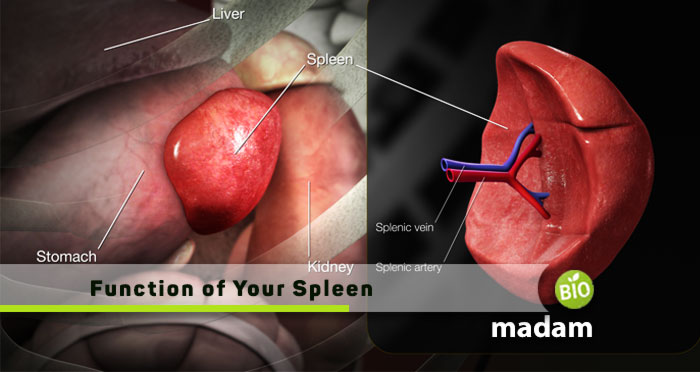The spleen, also known as the security guard for blood cells, has been associated with venting anger. You must have heard the phrase “venting spleen,” which means letting out frustration or anger, as people in the past thought the spleen was associated with a hot temper. However, scientific studies have proved that the spleen has various important roles than making you fume with anger. It acts as a filter for blood cells and ensures that your body has healthy cells. Keep reading to learn more about the functions of your spleen.
What is the Spleen?
The spleen is a small organ, the size of an avocado, yet it is the largest organ of your lymphatic system. The lymphatic system is a subdivision of various types of immunity and thus contributes to keeping your body safe from numerous antigens.
It is in the upper left region of your stomach inside the rib cage, just above the stomach, and under your diaphragm. The spleen is purple in color and soft in appearance. The size and weight of the organ may vary slightly from individual to individual. But, an average healthy spleen weighs six ounces and is around five inches long and three inches wide.
Functions of Your Spleen
Blood Filtration
Blood filtration is one of the basic functions of your spleen to keep your body protected from infections and diseases. The blood cells pass through the red pulp and circulate through the bloodstream. The spleen separates the malformed and damaged red blood cells, which are broken down by macrophages.
Preserves Iron
While the spleen removes the damaged cells, it ensures it conserves the iron when removing red blood cells. The iron is stored in the form of bilirubin and ferritin. The iron returns to the bone marrow, producing hemoglobin that facilitates oxygen transport from both lungs to other parts of the body.
Blood Storage
Storage of blood is another important function of your spleen. The blood vessels in the spleen constrict and dilate per the body’s needs. Expanded blood vessels in the spleen can hold as much as one cup of blood in reserve. This blood is used when your body experiences trauma and loses blood; the spleen uses the reserved blood to replenish when needed.

Protection Against Antigens
The spleen is a critical immune system component and protects your body against antigens and pathogens. The spleen creates lymphocytes with lymph nodes to produce antibodies that kill foreign bodies. Lymphocytes produce antibodies that stop the spread of infections by destroying germs.
Parts of Spleen
The spleen comprises two parts, each contributing to the abovementioned functions. The spleen comprises:
Red Pulp
The red pulp acts as a filter to get rid of damaged or old blood cells and remove wastes. It also eliminates bacteria and viruses from your body.
White Pulp
On the other hand, the white pulp plays a role in producing white blood cells that make different types of antibodies to fight infection.
What if the Spleen does not Function Properly?
As the spleen removes old and damaged red blood cells, a malfunctioning spleen may remove healthy blood cells or accumulate old blood cells. It may lead to:
- An increased risk of infection due to a reduced number of white blood cells in blood and plasma
- Blood deficiency or anemia occurs when the body gets rid of healthy red blood cells
- A reduced number of platelets may cause bruising or bleeding
Living without a Spleen
The spleen is a useful body part but not a vital organ. The spleen may be damaged and need to be surgically removed. The surgery to remove your spleen is known as splenectomy. The lymph nodes and liver performs most of your spleen’s crucial functions.
However, the lack of a spleen makes you more susceptible to bacterial and viral infections with delayed recovery. You may need a few vaccinations to ensure you enjoy a healthy life without frequent infections, including chicken pox, meningitis, encephalitis, influenza, shingles, tetanus, diphtheria and whooping cough (Tdap), Haemophilus influenzae type b (Hib), pneumonia, MMR, and human papillomavirus (HPV).

The Bottom Line
The main function of your spleen is to filter your blood and get rid of old and damaged red blood cells. It maintains the number of platelets, red blood cells, and white blood cells in the body. The spleen also acts as a blood reserve and may supply up to one cup of blood when the body experiences trauma. Other functions of the spleen include the conservation of iron and protecting the body against foreign bodies.
FAQs
What happens when you have spleen problems?
The spleen is a soft organ that may get damaged due to moderate stress. Damage to the spleen can cause inflammation and eliminate healthy blood cells from your bloodstream. Loss of healthy cells from the blood can result in more frequent infections.
How long can a person live without a spleen?
Removal of the spleen or splenectomy is not a life-threatening situation. However, it increases your risk for certain blood infections. The increased risk of infections stays a lifetime as your bodyguard is no longer part of the body’s anatomy and physiology. However, you must take additional care in the first two years.
How can I strengthen my spleen?
A healthy spleen is essential to maintain healthy blood cells and fight infections. A meat-rich diet, including beef, lamb, and poultry, can help strengthen your spleen. At the same time, vegetables, fruits, grains, and fish contribute to a healthy spleen.
What causes spleen pain?
If you experience pain in your spleen, it can be due to liver disease or viral and bacterial infections, including tuberculosis and HIV. Moreover, parasitic infections like toxoplasmosis and malaria may also cause spleen pain.
Is fasting good for the spleen?
Opposed to popular belief, fasting for long hours does not strengthen your spleen. Instead, it may lead to nutritional deficiencies. Eating properly at regular intervals keeps your GI and spleen healthy.
Can spleen become cancerous?
Malignant and benign tumors can occur almost anywhere in the body, and the spleen is also susceptible to cancer. Known as the splenic marginal zone lymphoma or SMZL, cancer in the spleen is quite rare, comprising only two percent of cancers of the lymphatic system.
What are the symptoms of spleen tumors?
Various signs and symptoms can signal the presence of a tumor in the spleen, including pain in the abdomen, enlarged spleen, unexplained weight loss, weakness, fatigue, night sweats, fever, etc.

Anna has completed her degree in Pharmacy from the University of Hawaii. She is serving as a research assistant in a pharmaceutical company. She had a great interest in writing blogs, traveling to different parts of the US, and trying delicious recipes in her spare time.

